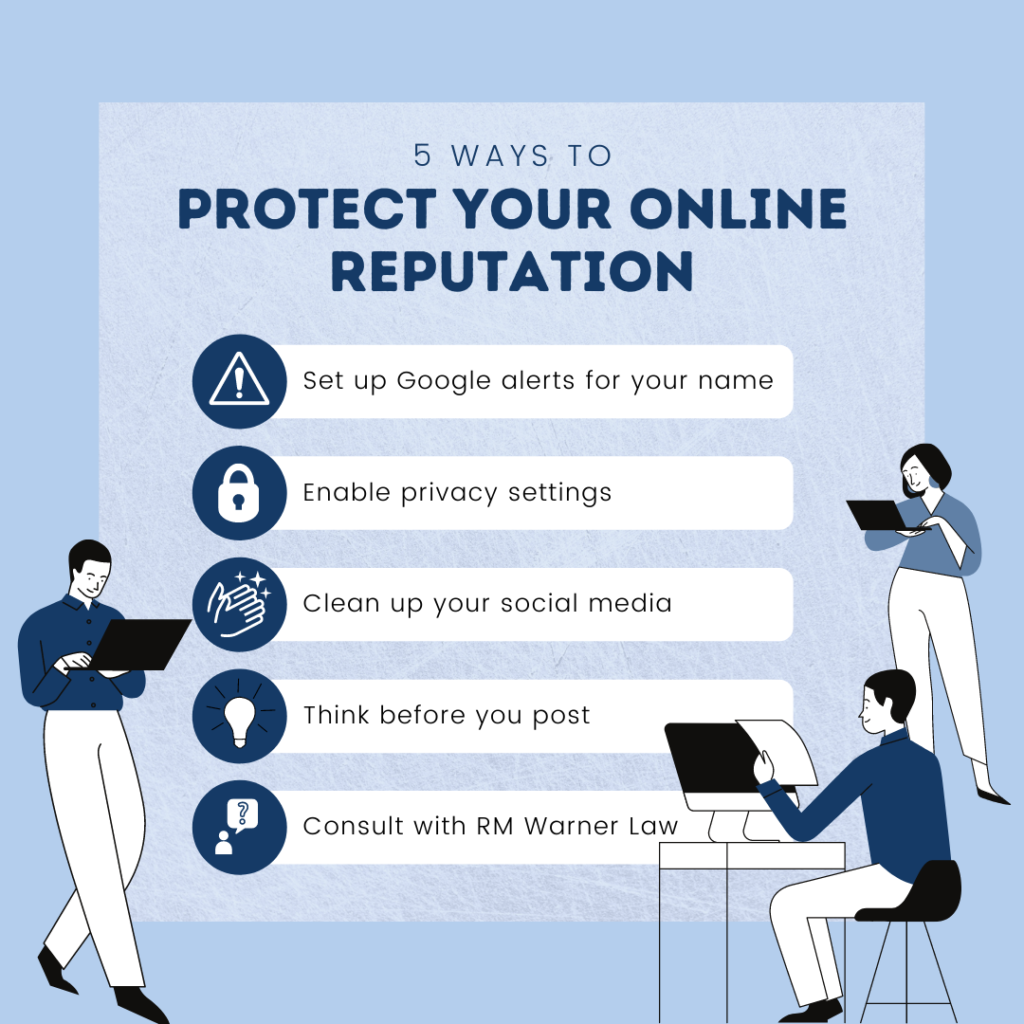5 Steps to Protect Your Online Reputation
5 Steps to Protect Your Online Reputation

Your reputation is formed by how people perceive you, good or bad. Online, it is a function of your presence and activities on the internet, making you vulnerable to risks that can tarnish your reputation. A seemingly harmless post may be misconstrued, your brand may be unfairly attacked, or saboteurs may post damaging content about you. These issues can lead to defamation suits and the need for an internet defamation attorney.
Damaged reputations can be costly and difficult to repair. Taking steps to alleviate some of the risks can protect your good name and character. Here are five steps to protect your online reputation.
1. Erase Sensitive Information Online That Might Compromise Your Online Reputation
If you have inappropriate videos, embarrassing photos, or personal health information saved anywhere online, there is a risk that someone might try to use that personal information against you online. Carefully search the internet and remove all sensitive information that could be used to compromise your reputation – including content shared or posted by your friends and family. The process will take time and effort, and you may not get all your information removed, but afterward, it will be much harder for someone to use your personal information to target you.
2. Track the Narrative
Find out what people are saying about you online. The internet provides several tools to make this task manageable. In addition to Google search, Google Alerts, social mention, and other social media monitoring tools use keywords to alert you of conversations mentioning your name. Use them to keep abreast of what is being said. Depending on what you learn, you may be able to address any negative issues before they escalate. Defamation, in particular, can be damaging. Early intervention with your internet defamation lawyer to address libel or slander issues can help safeguard your reputation.
3. Respond to Negative Statements Quickly and Respectfully to Protect Your Online Reputation
Combative responses to negative statements about you or your brand may not be the best approach, especially if the statements are untrue. Respond to issues calmly, respectfully, and as quickly as possible. Some issues may require you to take the conversation offline for resolution. How you react to what people post about you will determine how people feel about you online.
Untrue statements or attacks on you or your brand can constitute online defamation and cause irreparable damage if not handled properly. Successful resolution may require the help of an internet defamation lawyer.
4. Be Careful About What You Post
Content posted online can never be permanently removed, and it can quickly spread to a wide audience. Focus on positive content and think carefully about everything you post. Ensure that what you post aligns with your morals and what you stand for. Consider any possible consequences to your education or employment or if anyone could feasibly use the information against you in the future.
5. Choose Strict Privacy Settings to Protect Your Online Reputation
Control what and with whom family and friends can share about you by reviewing your privacy settings and selecting the strictest options over the default settings. For example, adjust Facebook to make your account private or customize who can view your posts. Instagram settings can be adjusted to control who can and cannot follow you. Depending on what you want to post, you can limit your sharing to non-followers, followers, or close friends.
Protect Yourself Against Online Defamation
Protecting your online reputation is an ongoing process. At RM Warner Law, our experienced defamation attorneys will work with you to limit the effects of defamation and reduce harm to your reputation. Call us at 1-866-570-8585 or complete our contact form to book a consultation today.
Similar like this
You also might be interested in
Mastering Defamation Defense: In-Depth Strategies from RM Warner
Accusations of defamation can be daunting and stressful. Understanding your [...]
E-commerce Law: Adapting to Global Trends and Regulatory Changes in 2024
In the dynamic digital commerce landscape, e-commerce law is a [...]
The Comprehensive Guide to Handling Defamation in the Era of Social Media
The power of social media is undeniable. It connects us [...]
Advanced E-commerce Legal Strategies: Navigating New Challenges in 2024
The e-commerce industry is witnessing remarkable growth and transformation in [...]






